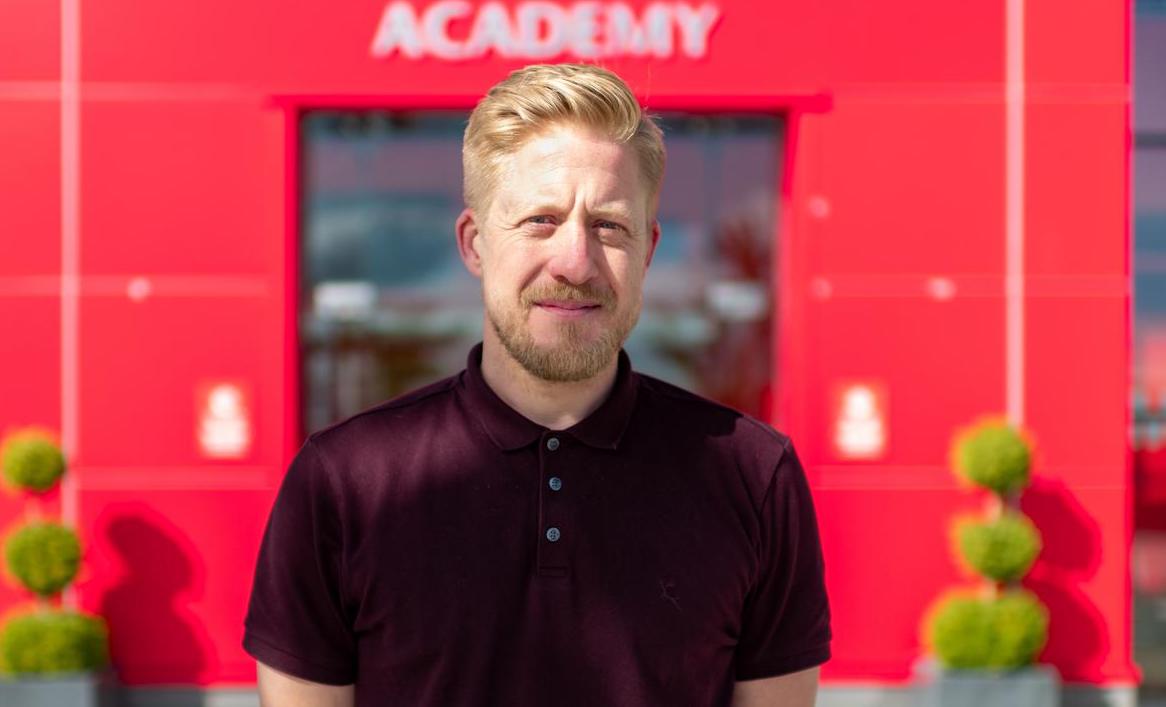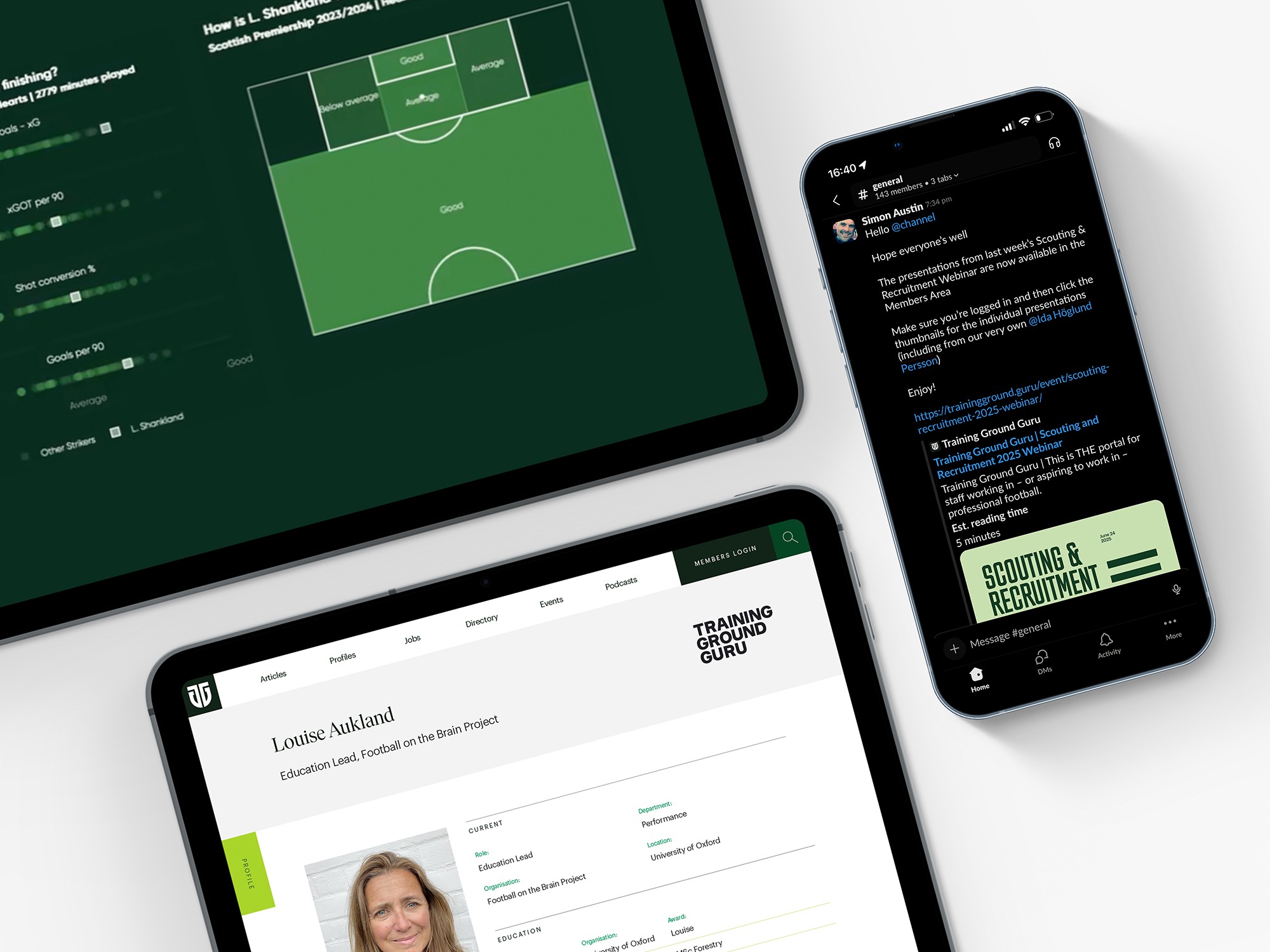
15
Nick Cox
Youth development the Man Utd way
June 11, 2020
How do you judge the success of an Academy?
Nick Cox, who oversees Manchester United’s, admits: “The most obvious measure is helping young people to make debuts and have successful careers as footballers.”
On that marker, United are doing exceptionally well. Homegrown players like Marcus Rashford, Scott McTominay, Axel Tuanzebe, Paul Pogba, Brandon Williams and Jesse Lingard are all regulars in the first team.
In December, United celebrated the 4,000th consecutive game in which an Academy graduate had represented the first team and the club has topped both editions of TGG’s Academy Productivity Rankings.
While Cox says the club is rightly proud of these achievements, he argues there is a “higher existence” than simply producing first-team players.
“There are only a small number of young people we work with who are actually going to debut at Manchester United,” he tells the Training Ground Guru Podcast. “A few more will go on to debut at other clubs and have successful careers.
“I’m a firm believer that if you make that your sole focus you will actually fail. So there is a higher existence, a greater victory than just producing talent, and that’s to help every player maximise their potential.
“We need to make sure our Academy and the programme we deliver is an amazing addition to childhood years, so that young people’s lives are enriched by being associated with us.
”Then they can reflect and consider that we were a positive influence on their life, regardless of whether they became a footballer or not. They can look back and think, ‘I’m glad I had the opportunity to be associated with Manchester United.
“I met people I never would have met, had experiences I never would have had, went to places I never would have gone to and I developed as a person.’
“If we can develop well-rounded people, robust people who have had a variety of experiences, then we make sure the journey our footballers go on is a positive one, regardless of the football outcome.
“My own personal mantra has always been that the journey is more important than the destination. I think that is widely accepted in our organisation as well – that there is a higher existence than just churning out footballers in a sterile fashion.
“We were proud to have hit that magical figure of 4,000 consecutive games with a homegrown player in the squad dating back 82 years. It’s something the fans demand, something the directors want to see, something the manager firmly believes in, and that’s wonderful.
“This is about more than just football though.”
Guardians of the culture
Cox was promoted from Head of Academy Operations to Academy Manager by United last July. He replaced Nicky Butt, who took on a new first-team development role at the club.
The former United and England midfielder (below), still has a major influence on the club’s youngsters, continuing a process that he himself went through as an up-and-coming player at Old Trafford.
“Nicky is one of those voices reminding us of where we have come from and the right way to do things,” Cox explains. “He is a huge influence on the culture for everything he’s been through – as a young Manchester lad who has been associated with the club from the age of 12.”
When Butt was a child, his hero was Bryan Robson, and the duo took part in a virtual Q&A with United’s Academy players earlier this month.
“We had a lovely conversation the other week with Nicky and Bryan,” Cox reveals. “When Nicky broke into the first team, Bryan was finishing his career.
“Bryan looked after him, made sure he was there for him. When you have a large number of players debuting, they drag the next ones along with them. They do that by inspiring them, ‘You’re just like me, I can achieve it too’.
Cox says everyone who works at United realises they are part of a culture that stretches back to Sir Matt Busby, the first United manager to win the European Cup, and his assistant Jimmy Murphy.
“It’s important for all of us to understand we are guardians of a culture that has been built over many years,” Cox says. “Manchester United has always been innovative and cutting edge and we want to continue to do that, but we must also keep that tension between where we want to get to and where we have come from.”
The Academy Manager says this understanding of the legacy and culture is also greatly helped by the likes of Academy Programme Adviser Tony Whelan, Academy player liaison officer Dave Bushell, and Foundation Phase Lead Eamon Mulvey, who have been with the club for more than two decades.
“It’s really important that we leave room in our environment to make sure we continue to embrace the knowledge we have in some amazing long-standing members of staff,” Cox says.
“We are blessed to have the likes of Tony Whelan, Dave Bushell and Eamon Mulvey in our organisation, people who have been with us for more than 20 years working with young people.”
Act like you don’t have resources
Before joining Manchester United, Cox was Academy Manager at Watford and Sheffield United. He says he took lessons from both clubs before moving to the North West.
“At Sheffield United, we went with the mantra of being the world’s greatest boys’ club,” he recalls. “We tried to have a part-time model where we were just evenings and weekends and made that feel like a really wholesome youth club.
“Watford was the first-full time model in the country, in terms of a secondary school education, and that allowed us to develop players on a full-time basis from the ages of 12 to 16. The club also had an amazing commitment to opportunity and a business plan that said, ‘We will give players debuts’.
“The club faced administration and knew that developing young players was going to be a route to making sure we had a sustainable organisation.”
Now Cox works at a club with immense resources, but says the secret is to operate as if there are none.
“(United) is a juggernaut,” he says. “It’s the biggest club in the world and you don’t know what that looks like until you get inside.
“There is additional pressure because of the spotlight from the world’s media, there is disposable resource, there is an unbelievable history of developing young people.
“But we have to create a world where it feels like we don’t have resource. Without resource, you become incredibly innovative and creative.
“If you want a humble environment for your players, it can’t be decadent; if you want a tight culture and clear communication you can’t have loads and loads of staff.
“I’m also a believer that opportunity is one of the top ingredients you need to develop young people.”
Avoid early professionalisation
Much as he believes an Academy is about more than producing pro players, Cox also argues that clubs should not be professionalising youngsters too soon.
Currently, clubs are not allowed to register players until the U9s, although, in reality, they are scouting and coaching kids at younger and younger ages. From next season, the Premier League is introducing pre-Academy regulations for the first time, though not a minimum age at which kids can be involved with a club.
Cox says he understands some of the reasons behind the Premier League’s decision not to introduce a minimum age, and that the regulations are likely to be adapted over the coming years, but he adds: “My personal feeling is that you don’t want to specialise and professionalise too soon.
“In the best interests of the long-term development of a young person, you are better off holding back wherever you can. That’s what we try and do at United.”
Bayern Munich recently announced they were scrapping their U9 and U10 teams, making entry to their Academy the U11s instead. Cox welcomes the move, which is in line with initiatives by the likes of US Soccer and sports in certain Scandinavian countries.
“There is some quite significant research by (Arne) Güllich that looks across a variety of sports across the world and draws the conclusion that junior success is not really an accurate indicator of long term potential,” he says.
“When performers present themselves at a young age as being full of high potential, what we are actually seeing are the results of early practice, early maturation and maybe some physical advantages.
“The other thing to consider is an element of survivorship bias. We can take a retrospective view of our approach to recruitment, celebrate the young players who went all the way through the system, and erase maybe the number of journeys that weren’t successful. That then reinforces our original approach to talent identification at such a young age.
The Academy is part of an ecosystem and kids should bounce around various bits - their mates, their school, other sports, different levels of football.
Nick Cox
“My belief is as long as you design your programme with the understanding that it’s very difficult to identify talent at a young age you won’t go too far wrong.
“If you get very professional at a young age then these kids are going to burn out. Maybe their love and joy of the game is diminished and we don’t want that.
“Their journey is a long one. I like to think the Academy is part of an ecosystem and kids should bounce around various bits – their mates, their school, other sports, different levels of football. (At United) we like to go slow and steady and make the experiences the boys have with us to be childlike, appropriate and authentic.
“No-one really quite understands where players are going to get to in the long term and we have to be really honest about that. We’ve designed a system in this country that kind of gives the impression we know.
“Actually we don’t know and anyone who claims to is probably ill-informed.”
This content is for TGG Members
Join up today and get access to:
- All articles: news, interviews, analysis
- Masterclasses & Online Conferences
- Full Academy Productivity Rankings
- Club Directory: 1,000+ staff profiles
- Personal Profile Builder
- TGG Live 2024 & 2025 presentations
